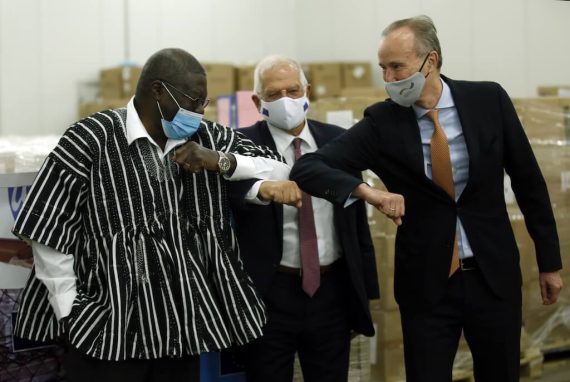The issue of vaccine diplomacy is increasingly impacting pandemic-driven foreign policy decision-making. Evidence suggests that medically advanced high- and upper-income countries – those that developed their own vaccines against COVID19 – exhibit different foreign policy behaviors and crisis management techniques in terms of global vaccine distribution and international cooperation. The situation is becoming even more complex considering the fact that there are not only states that act as primary and unitary actors, but also non-state actors (e.g., vaccine producers) that influence international relations.
There are a few selected examples that show the different foreign policy behaviors of state and non-state actors regarding vaccine diplomacy. The U.S., for instance, pursues rather multilateral mechanisms for vaccine administering, largely financially supporting the World Health Organization’s (WHO) COVAX initiative to provide vaccines to the poor and underdeveloped countries.
However, the U.S. is reluctant to direct commitments for vaccine distribution before the inoculation of American citizens is completed. Russia, on the other hand, mostly focuses on bilateral negotiations and agreements. Through the Russian Direct Investment Fund (RDIF), the country manages global manufacturing, promoting, and distributing its Sputnik V vaccine worldwide. To date, more than sixty countries have approved Sputnik V and the number is gradually increasing.

VIDEO: How Covid vaccine diplomacy is helping India win back its neighborhoods
The U.K.-Sweden company that developed the Oxford-AstraZeneca vaccine is currently experiencing delivery delays over which the European Commission has launched legal actions given that the vaccine is in high demand in the EU. Despite such actions, the company reaffirmed its commitments to COVAX. Finally, Johnson & Johnson’s single-shot vaccine producer signed an advance purchase agreement with the African Union’s 55 member states but also committed to a not-for-profit basis vaccine distribution through the COVAX facility although no earlier than 2022.
In all cases, policy-making has already moved to crisis management aiming to achieve health security, but also to produce results on a profit basis that are equally acceptable to both national audiences and the international community.
Both, state and non-state actors pursue their own goals when it comes to the way they act on the international stage, while balancing between promoting national interests, making international commitments, and seeking commercial advancement.
In all cases, policy-making has already moved to crisis management aiming to achieve health security, but also to produce results on a profit basis that are equally acceptable to both national audiences and the international community. The hypothesis here is that vaccine diplomacy lies in the space of the rational choice approach which is a method for assessing a nation state’s individual, goal-oriented foreign policy decision making and behavior.
Vaccine diplomacy is neither the expression of altruism nor of naiveté by a nation state or the companies associated with them. Instead, it’s a pragmatic approach in foreign policy decision-making to advance foreign policy goals.
In this regard, vaccine diplomacy appears to be an effective practice that puts together various international actors, collective entities, and issues that they all address within the space of a rationalist approach. The rational choice approach model includes: (1) strategic communication and strategic interaction; (2) negotiation and bargaining; and (3) international treaties and agreements that lead to international commitments. Taken together, these elements compose and define vaccine diplomacy, making it an essential mechanism of international cooperation.
During a pandemic, crisis-driven vaccine diplomacy can become the core element of international relations and international cooperation. Here is why. The ideational and material accounts of international cooperation are influenced and orchestrated by leading and medically advanced countries.
Foreign policy behaviors among and between actors and the issues they address promptly leads to complex interdependence, making international cooperation the only option at a time punctuated by the crisis. It’s foreseeable that communication, negotiation, and bargaining lead the way to increasing the number of international treaties and commitments.
The role of communication and strategic interaction in promoting international cooperation is critical. On the one hand, there is bilateral interstate communication which is often less transparent but presumably more effective considering the small number of parties involved in the diplomatic negotiation. On the other hand, there are large international organizations that are the agents of international cooperation.
International organizations are more observable and transparent. They also secure the membership and conditional participation of less developed countries in the communication process. Either way, bilateral or multilateral communication facilitates cooperation among states in which rational approaches prevail. This might explain the impressive number of Russia’s bilateral agreements in vaccine distribution, and the multilateral COVAX initiative. Either way what promotes global health, puts the global health security forward.
Negotiations and bargaining are the elements of statecraft and statesmanship that help pursue interests and propose solutions. From the rationalist approach perspective, it could be that negotiating sides don’t delve into ideological or political differences as these might put constraints on the negotiation outcome. . Even countries or groups distinct from one another are motivated to work together. Such countries or groups desire solutions and attempt to find the potential to compromise using bargaining strategies and scenarios to identify mutual benefits and maximize their international advantage rather than seeking absolute gains within the win-lose paradigm.
From a practical perspective, when countries or companies produce more treaties and agreements on the distribution of vaccines, this signifies that the effort to combat the pandemic on a global scale is underway. Thus, vaccine diplomacy negotiations and bargaining, emerging from strategic communication and strategic interaction, appear to be the tools of rational choice in the context of complex interdependence at the levels of bilateral and multilateral relations.
Recommended
The issue here is the scale and timing in solving global public problems because solving the problem benefits everyone. Moreover, the commitment to cooperation in bilateral agreements enhances international cooperation with better policies and more effective international institutions.
Even though nation states might have conflicting goals and companies might seek financial benefits, the rational choice approach paves the way to a growing body of work on international cooperation. Communication and diplomatic negotiations further lead to bargaining, resulting in signing agreements and undertaking further international commitments.
Taken together, these elements suggest that vaccine diplomacy can be better understood by the rational choice approach. Promoting vaccine diplomacy as a form of foreign policy behavior can help advance the analytical and theoretical scope of the former, and inform policy-makers in a way that they can make better decisions in combatting COVID19 both on a national and an international level.





